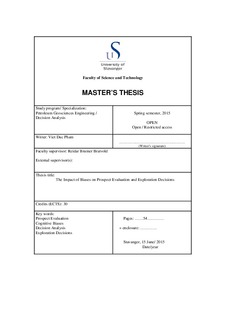| dc.contributor.author | Pham, Viet Duc | |
| dc.date.accessioned | 2015-11-24T13:36:13Z | |
| dc.date.available | 2015-11-24T13:36:13Z | |
| dc.date.issued | 2015-06-15 | |
| dc.identifier.uri | http://hdl.handle.net/11250/2365491 | |
| dc.description | Master's thesis in Petroleum geosciences engineering | nb_NO |
| dc.description.abstract | “Decision making was never quite as easy as rationalists would have us think…. Our brains are too limited.”
-Amitai Etzioni (1989)
Petroleum exploration ventures always require decision-making in the face of uncertainty. In order to evaluate prospect to support good decision-making, geoscientists must consistently assess their uncertainties for the key geological factors and estimate economic values.
As voiced by Etzioni – even the brightest experts fall prey to the human limitations and the common errors that people tend to make when pursuing complex decisions in the face of uncertainty. There is no reason to believe that petroleum geoscientists are any less prone to common cognitive limitation in their assessment of the uncertain and complex factors underlying the required assessments in prospect evaluation.
Cognitive biases often produce significant inconsistencies that lead to suboptimal exploration decisions. The central question investigated in this work is the impact of common biases on the oil and gas prospect evaluation and decision-making. We study this question by modeling and simulating the impact of the overconfidence bias and bias from trust heuristic. This allows us directly measuring the effect of the biases on the assessment of value as well as the impact on decision-making. We demonstrate that the tendency of being overconfident in our assessment of uncertainty has significant impact on the exploration decision and prospect evaluation. We also examined how the use of multiple experts can help to reduce the degree of overconfidence compared with only a single expert. Finally, we illustrate and discuss approaches for calibration and verification of uncertainty judgment. These approaches can use to help reduce the impact of biases by ensuring that experts become calibrated better in their assessments. | nb_NO |
| dc.language.iso | eng | nb_NO |
| dc.publisher | University of Stavanger, Norway | nb_NO |
| dc.relation.ispartofseries | Masteroppgave/UIS-TN-IPT/2015; | |
| dc.rights | Navngivelse 3.0 Norge | * |
| dc.rights.uri | http://creativecommons.org/licenses/by/3.0/no/ | * |
| dc.subject | petroleumsteknologi | nb_NO |
| dc.subject | petroleum engineering | nb_NO |
| dc.subject | exploration decisions | nb_NO |
| dc.subject | decision analysis | nb_NO |
| dc.subject | prospect evaluation | nb_NO |
| dc.subject | cognitive biases | nb_NO |
| dc.subject | petroleumsgeologi | nb_NO |
| dc.title | The impact of biases on prospect evaluation and exploration decisions | nb_NO |
| dc.type | Master thesis | nb_NO |
| dc.subject.nsi | VDP::Technology: 500::Rock and petroleum disciplines: 510::Geological engineering: 513 | nb_NO |

